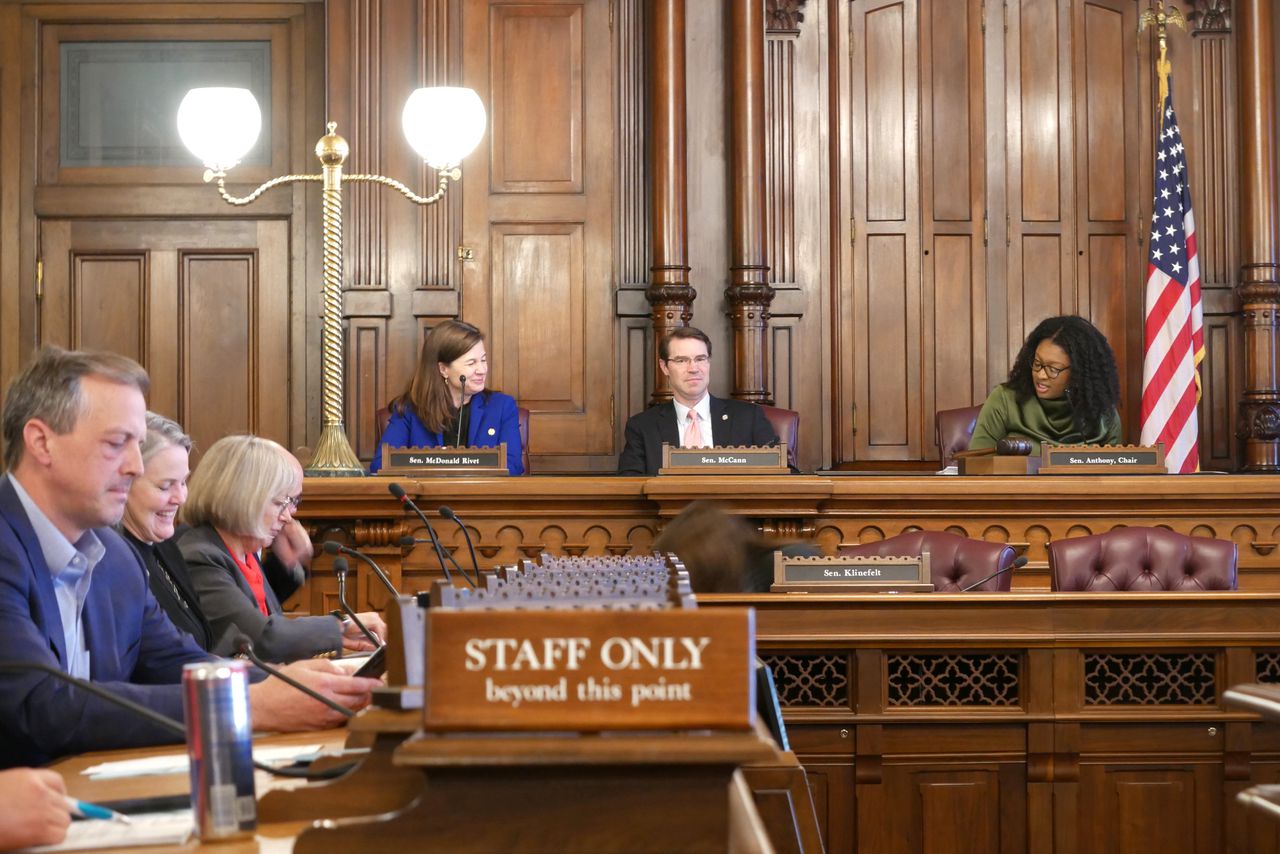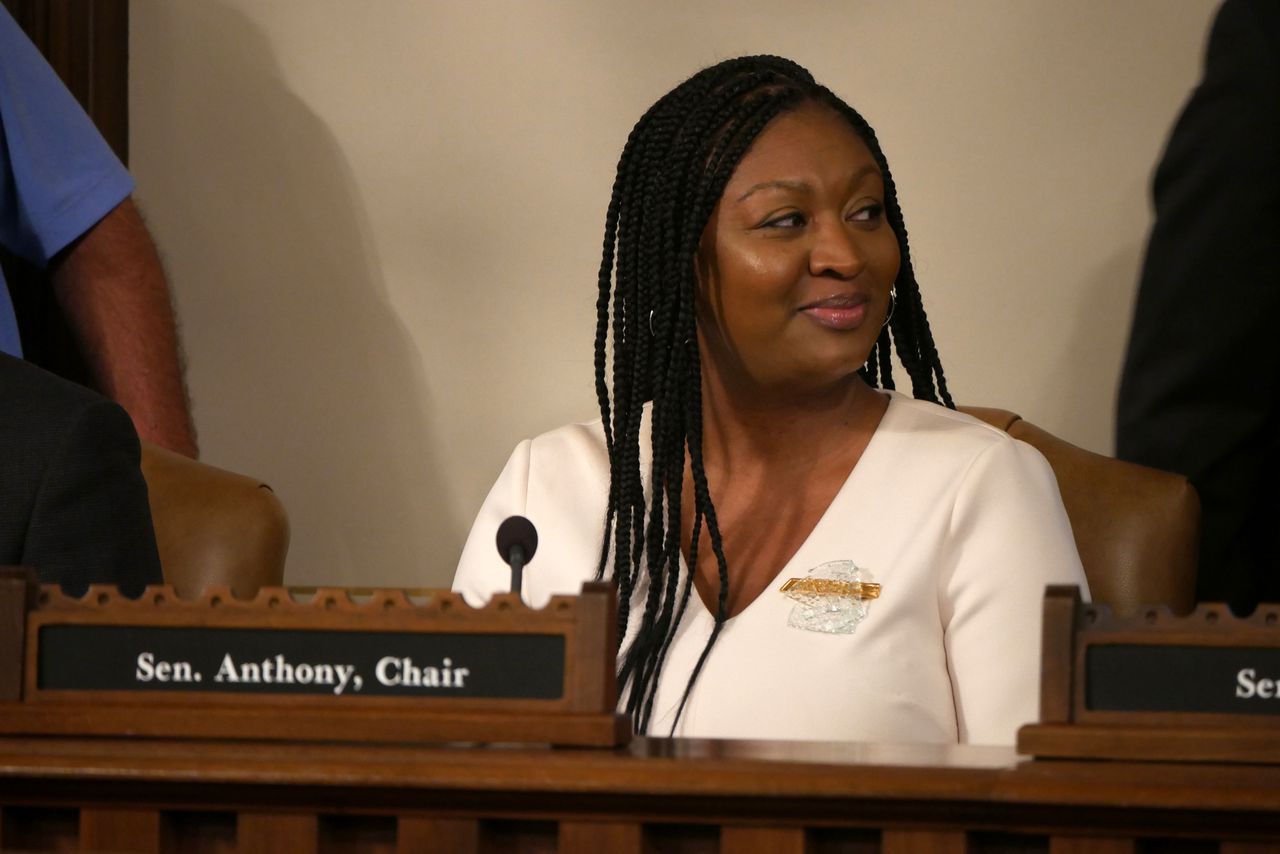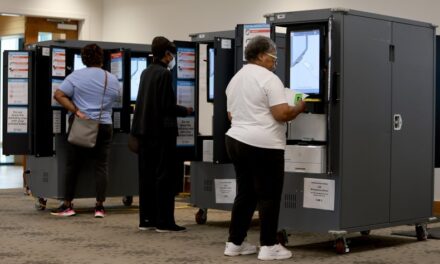Although she always wanted to do something in politics, Michigan Senator Sarah Anthony never exactly saw herself as a politician.
Like most children growing up in Lansing, she said, she assumed she would become a state government employee or work for General Motors as her parents had.
Fast forward to now: Anthony, 39, has entered her third term in the Michigan legislature and made history as the first Black woman to lead the powerful Appropriations committee. Not only is Appropriations the largest Senate committee, but it has authority over all state spending in the upper chamber.
“This was never, never on the bingo card ever,” Anthony told MLive. “This is all bonus.”
Although she recognizes the significance of her position, she does not focus on her race and gender, Anthony said. It’s what those things represent in terms of how Black women, and women in general, show up in leadership positions, she said.
“I’m never going to be, you know, the person who’s yelling and screaming,” Anthony said. “I don’t like the gamesmanship of politics. That doesn’t resonate with me.”
She takes credit, however, for securing necessary Republican support on the newly passed $82 billion budget and novel investment in diverse communities. Part of that, she said, comes from “being a woman and being a Black woman.”
“It has shaken up the institution a bit, and I’m OK with that.”
The shake-up is evident the moment you walk into Anthony’s Capitol office. Portraits of past Appropriations chairs line a wall. All have one glaring similarity — they are older, white men.
“When I look at that wall of the men who have like, done this job before me, I know that they didn’t have the same level of community connection,” Anthony said. “Particularly like communities of color, they expect you to show up. They expect you to be present for the church service, and you don’t just show your face, you stay for the whole church service.”
Anthony graduated from Everett High School on Lansing’s south side and earned degrees from Central Michigan and Western Michigan universities. Before her time in the Capitol, Anthony served as an Ingham County commissioner. She was deputy director of the Michigan College Access Network, which prepares students for higher education, for nearly a decade.
A freshman member of the Senate, Anthony has represented Lansing since elected to the state house in 2018.
The capital city is one of the larger and more diverse mid-Michigan cities, with about 22% of its residents living at or below the poverty line. The view from her office balcony — of the Michigan State University campus, wealthy lobbyists and the city’s homeless — is a staunch reminder of the varying aspects of Lansing life, Anthony said.
Working alongside House Appropriations Chair Angela Witwer, another Democratic mid-Michigan legislator from Delta Township, Anthony said she hopes to make Lansing “look and feel like a capital city should.” For her, this means more entertainment and cultural activities, in addition to affordable housing.
Because she believed she could do more work at the state level than in Washington, D.C., she is forgoing a congressional run for U.S. Rep. Elissa Slotkin’s open House seat after months of speculation.
“There (are) other careers that I could absolutely choose that I can make more money, I can travel more, I wouldn’t have as much scrutiny, but I love my city,” she said.

Senator Sarah Anthony, Appropriations Committee chair, interviewed in her office on Friday, June 30, 2023. (Drew Travis | MLive.com)Drew Travis | atravis@mlive.com
On any given day on the Senate floor, Anthony is rarely stationary at her desk. She is often buzzing about, talking to different lawmakers about policy matters or running back to her office for meetings with stakeholders.
Anthony is known among her colleagues, staff and community as an authentic communicator capable of building strong relationships.
Senate Majority Leader Winnie Brinks, D-Grand Rapids, said she had no qualms appointing Anthony as Appropriations chair because of these qualities. The pair first crossed paths when both were members of the House five years ago.
“I’ve just been really impressed with her,” Brinks said. “She had all the right ingredients to be a fantastic Appropriations chair.”
But Anthony’s rising success hasn’t been without its challenges.
More than once, she’s been the target of racist and misogynistic threats that required law enforcement intervention.
Early in the COVID-19 pandemic, an armed security detail of activists had to escort her to and from the Capitol as armed protestors loomed over lawmakers in objection to the governor’s stay at-home-order.
Most recently, her job requires constantly juggling interests of her fellow lawmakers, long nights of negotiations and anxiety around ensuring the state budget reflects the needs of Michiganders.
The morning the legislature passed the 2023-24 budget, she reflected on months of work and personal sacrifice.
“Did you have ever a time where you’re like, I just wanted to like throw in the towel?” Anthony said. “I’ve always wanted to take the job really seriously… being the ‘first only’ thing and just by nature. This being my first budget, I wanted to be more of a technician, then a politician because I don’t want to just repeat talking points.”
“So I am actually exhausted…But you know, I think that’s what it takes.”
Later in the day, Anthony missed multiple calls from her mother, one of several women she references as strong presences in her life.
She was in the throes of a busy session, but prepared for an emergency. Once they were able to connect, she said her mother simply wanted to know how she was doing.
“My mother does not see me as the appropriations chair, she does not see me as a senator, she sees me as her baby,” Anthony said. “She is good for seeing me on the news and saying ‘Baby, you look tired’ or ‘Make sure to get some rest’.”

The Michigan Senate Appropriations Committee, chaired by Lansing Democratic Sen. Sarah Anthony, far-right, convenes at the state Capitol in Lansing, Mich., on April 26, 2023.Ben Orner | MLive.com
Jim Stamas, a Midland Republican termed out of office, can relate. He served as Appropriations chair from 2019 to 2022.
“It’s not a 9-5 job, it’s closer to 16-hour days, if not a little more. Then, your mind doesn’t usually stop,” Stamas said. “I think she’s done a nice job navigating those waters in the first year.”
In the past few months, Republican senators criticized Anthony for a lack of transparency throughout the budget process. The budget is the largest in Michigan history and the first under an all Democratic-led state government in four decades.
But the “political theater,” as she likes to call it, doesn’t sway her plans.
“It’s interesting, like there’s the public relationship and then there’s the private relationships,” Anthony said. “I have grown really thick skin to see Republicans who are blasting me, blasting Democrats.”
No other Republican may have worked as closely with Anthony this year than Senate Appropriations Minority Vice Chair Jon Bumstead, R-North Muskegon.
He said she’s included him “in all the conversations as far as the Republican side” and she’s been “very upfront and honest” with him.
“I know when you’re in the minority, you’re not going to get quite the same thing when you’re in the majority, and people need to understand that.” Bumstead said.
When speaking about Anthony, he added, “she’s a smart gal and she’s fun to work and to be around. She’s just a good person, and not that we have to agree politically on anything or things all the time.”
Anthony said she is motivated by communities of people she thinks have too often been overlooked.
First introduced in 2019, her CROWN Act bill to ban race-based hair discrimination in Michigan became law last month. The legislature also passed a bill to raise the legal of marriage in Michigan to 18, which she initially proposed in 2018.

Senate Appropriations Committee Chair Sarah Anthony, D-Lansing, pictured in front of portraits of former state Appropriations chairs on Friday, June 30, 2023. (Drew Travis | MLive.com)Drew Travis | atravis@mlive.com
A woman of faith, she said it’s a blessing to help bridge the gap between her community and state government.
“Hopefully, my legacy is being able to have an ear to the streets and bring those perspectives here. So that they can see themselves in the state budget, which in my mind is one of the most powerful mechanisms for change in politics,” she said.
The day the budget passed, she wore a pin symbolizing breaking glass ceilings. It was a gift from former Lansing state Rep. Joan Bauer, who employed Anthony before she became a lawmaker.
“When we talk about breaking barriers and shattering glass ceilings. It’s messy, right? In some ways, it’s dangerous,” Anthony said. “Because you are dismantling how things have always been done.”

Michigan state Sen. Sarah Anthony, D-Lansing, is pictured wearing the pin gifted from former Lansing state Rep. Joan Bauer on June 28, 2023.Ben Orner | MLive.com
Read more from MLive:
Gotion pushes timeline of Michigan battery plant to 2031
Hearing to determine if Michigan school shooter will get life in prison viewable online
Abortions for out-of-state women increase 66% in Michigan post Roe
For famed Michigan quadruplets, a life in the spotlight masked mental illness and abuse





